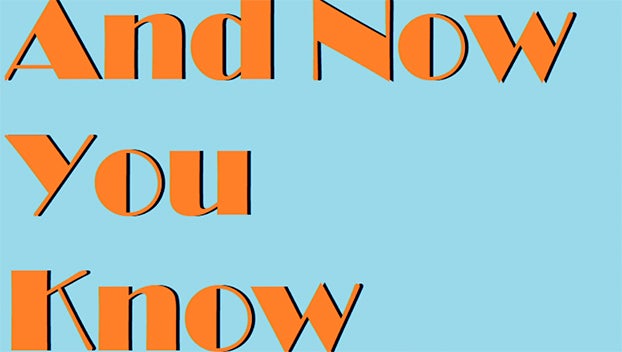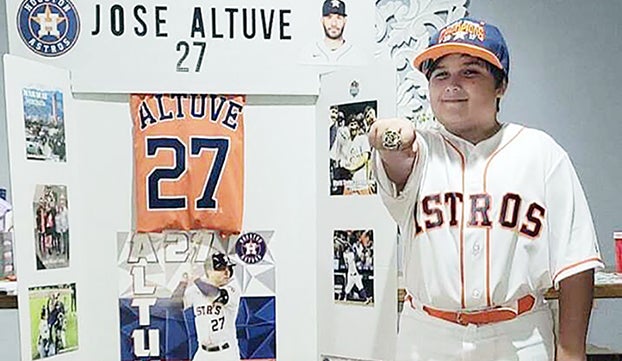Signs of the Times
Published 12:28 pm Wednesday, December 2, 2015
by Dr. Don Newbury
A picture’s worth equaling a thousand words has long gone unchallenged. Of course, few of us have been threatened by depth-probing questions aimed to determine how deeply we believe in the accuracy of this comparison.
In the great scheme of things–maybe even schemes of modest proportions–it hasn’t mattered. The world cares not if we’d go to the mat defending this assertion. It doesn’t notice if our body language is interpreted as shrugging. Maybe we actually feel that comparing pictures and words–like apples and oranges–makes for unreliable research.
I’ve neither seen–nor heard–of picketing groups bent on challenging this axiom. Should this occur, perhaps an attention-grabbing sign might read, “One Word Is Worth One-Thousandth of a Picture.” Considering such a reversal of the claim raises hackles of fear concerning any mathematical reference. I will strive for peaceful co-existence with proponents–both for and against–how pictures stack up with words, and vice versa.
I take this vow of tolerance because a bigger battle looms. General usage of emojis–coupled with their legitimacy heightened recently by the Oxford University Press—threatens to render both pictures and words obsolete.
Consider plights artists–as well as wordsmiths–yet to be born. Better they concentrate on these simple symbols exploding all around us to convey emotions.
Never mind whether the recipient shares the same emotion; the sender is immediately departed, with things to do and people to see.
Back to the Oxford folks, who recently announced their “word of the year.”
For 2015, the “winner” isn’t a word; it’s an emoji. Specifically, it has a smile, flanked on both sides by big tears falling from big eyes.
The depiction is intended to convey “tears of joy.” Here’s hoping recipients notice the mouth to be decidedly upturned, thus propping up joyful tears instead of death from laughing.
I’ve been a fan of words since the floppity, first-grade books of Dick and Jane, and am ever thankful for my first exposure to “Oh, Oh, Oh’s!” and “Look, Look, Look’s!”
Like bankrupt bookstores, we face the grim prospect of words failing us. Emojis are like camels with noses under tents. Give them an inch and they’ll take a reservation. In the beginning, there was a lone emoji based on a “smiley face” turned out by a French graphic artist in the early 1970s.
Most of us could deal with that, treating them sorta like our complimenting new-born kittens and puppies. They’re destined to become “less cute” as they rip upholstery, gnaw favorite house shoes and commit other pet crimes, most of which are dismissed.
Apple–not the one Eve scarfed down in “the garden”–is the shark swimming about. Their techsters–smelling blood in the water–are supplying many emojis, unleashing 150 new ones this fall. (Some linguists say they are the fastest-growing language in history.)
I am saddened by long hours our forefathers spent searching for the perfect word. Abe Lincoln once apologized to a friend for a long letter because he “didn’t have time to write a short one.”
The late Spike Jones–whose irreverent band played the novelty tune “Beetlebomb”–would need a changed ending today. Back then, words would do, augmented by “assorted sounds.”
Certain age folks remember Jones’ “music” salvaging the clangs and crushes emitted from the opening of Fibber McGee’s closet on radio. Such raucous noises accompanied the harried race announcer’s word pictures at the finish line.
“It’ll either be a photo finish or an oil painting,” the announcer screamed. Throughout most of the race, he’d described with clever words “Beetlebomb’s” bringing-up-the-rear position.
Uh oh. I probably shouldn’t have re-visited “Beetlebomb.” Horse race finishes will give Apple brain trusts new ideas for emojis to describe horse race finishes.
Years ago, world class speaker Bob Murphey, a Nacogdoches, TX attorney who spent more time entertaining audiences than trying cases, may have been on to something when he said the introduction of the zip code brought with it some relief.
And maybe it did. “It may have started in our town,” he explained. “We couldn’t spell ‘Nacogdoches,’ so government folks thought it would be easier to simply number it.”
Whatever, good luck with your new emoji catalog.
Dr. Newbury is a speaker in the Dallas/Fort Worth Metroplex. Inquiries/comments to: newbury@speakerdoc.com. Phone: 817-447-3872. Web site: www.speakerdoc.com. Columns archived at venturegalleries.com, newbury blog.





